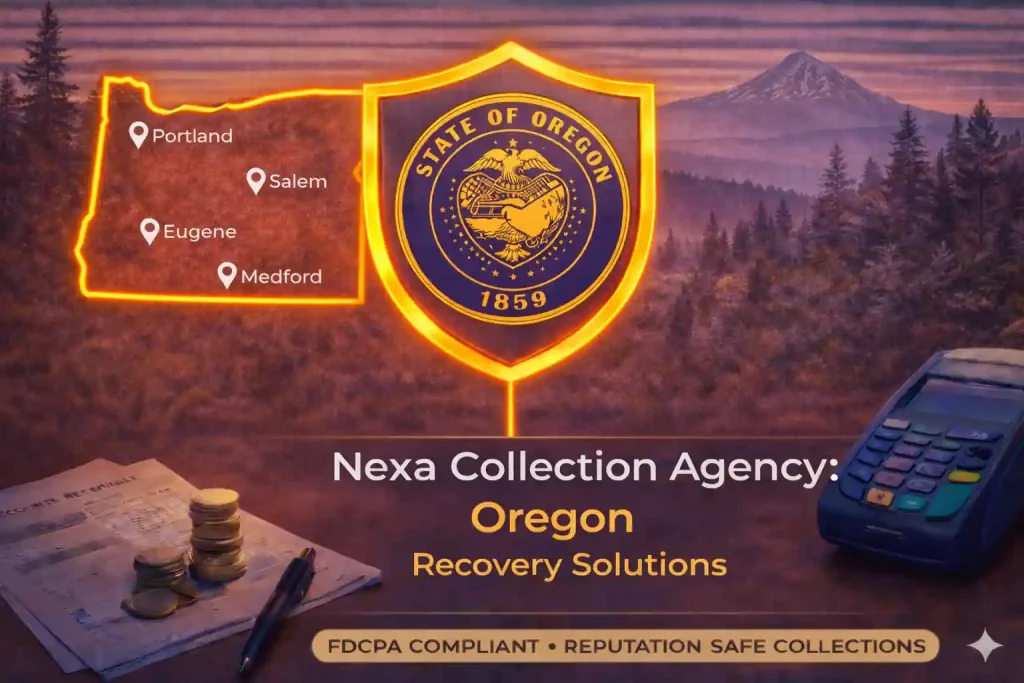In Oregon—from the tech hubs of the Silicon Forest to the shipping lanes of Portland and the medical centers of Eugene and Salem—brand reputation is your most fragile asset. As of January 1, 2026, the rules for getting paid have entered a critical “grey area.” While Oregon’s SB 605 officially prohibits health care providers and agencies from reporting medical debt to credit bureaus, a recent federal judicial hold on the CFPB’s national ban has created a legal battleground over state-level preemption. You don’t just need a collector; you need a strategist who can recover your revenue through sophisticated mediation and judicial bank levies while navigating the complex “grey zone” between Oregon state law and federal court mandates.
Nexa provides 100% reputation-safe, equipped with all 50-state collections license, offering free credit reporting, free litigation/bankruptcy scrubs, and zero onboarding fees. Secure – SOC 2 Type II & HIPAA compliant.
Need a Collection Agency? Contact us
The Oregon Legal Landscape
Oregon offers a 6-year window for recovery, but its “Consumer Shield” laws require surgical precision to avoid high-penalty counter-suits.
| Debt Category | Statute of Limitations | Oregon Statute (ORS) |
| Written/Oral Contracts | 6 Years | ORS § 12.080 |
| Medical Debt | 6 Years | SB 605 (2026 Reporting Ban) |
| Wage Garnishment | 25% Cap (High Floor) | ORS § 18.385 |
| Construction Liens | 75 Days | ORS § 87.035 |
| Judgments | 10 Years (Renewable) | ORS § 18.180 |
Critical Oregon Rules for 2026:
-
The “Grey Area” Medical Ban: Oregon’s SB 605 bans medical debt reporting as of 2026. However, because a federal judge has put a hold on the CFPB’s national ban, there is significant legal debate about whether federal law preempts state-level bans. Nexa utilizes a “Mediation-First” model to secure payments through bank levies and voluntary plans, protecting you from the risk of being a “test case” in this federal-vs-state conflict.
-
The Portland Wage Shield: In 2026, the Portland Metro minimum wage is $16.30/hr. Oregon law (ORS 18.385) protects a massive portion of a debtor’s income. Nexa uses advanced asset-scrubbing to ensure you only spend money on legal filings for debtors who exceed the $338–$400 weekly “protected” floors.
-
The 75-Day Construction Cliff: For contractors and HVAC trades, you have exactly 75 days to record a lien. Nexa triggers a “Step 1” demand immediately to ensure payment before your lien rights expire.
-
DFR Compliance: Oregon requires strict Collection Agency Registration. Nexa is fully compliant, shielding you from the “Unlawful Collection Practices” penalties that local judges frequently award.
Cost-Effectiveness: The Nexa Advantage
-
Fixed-Fee Recovery ($15/account): Best for early-stage and high-volume accounts. Debtors pay 100% directly to you.
-
Contingency Service (20%–40%): Performance-based recovery. No Recovery, No Fee.
Industries We Serve in Oregon
-
Healthcare, Dental & Medical: 100% HIPAA-compliant. We manage the SB 605 “Grey Area” transition, helping practices recover funds without violating the 2026 reporting ban or charity care requirements.
-
Manufacturing & Logistics: B2B recovery for the Silicon Forest and the Port of Portland. We handle high-value freight brokerage and warehousing disputes.
-
Construction & Trades: Revenue recovery for HVAC, electrical, and general contractors. We specialize in ORS Chapter 87 and meeting the 75-day recording deadline.
-
Colleges & Universities: From UO to OSU, we manage tuition recovery with a student-first mediation approach that preserves your institutional reputation.
-
Accountants & CPA Firms: Recovery of professional service fees. We understand the Oregon tax cycle and ensure you get paid without damaging client rapport.
-
Banks & Credit Unions: Expert handling of delinquent consumer loans and deficiency balances using Oregon’s 10-year judgment potential.
-
B2B Commercial, Restoration & Waste Management: High-speed recovery for service providers in Bend and Beaverton who need cash flow restored immediately.
Recent Oregon Recovery Results
Case 1: Portland Metro Multi-Specialty Clinic (Medical)
-
The Problem: $152,000 in patient debt. The practice was paralyzed by the confusion over SB 605 and the federal court hold.
-
The Result: Nexa implemented a 2026-compliant mediation strategy that bypassed credit reporting entirely, recovering $98,000 in 65 days via bank levies.
Case 2: Hillsboro Tech Logistics Firm (B2B)
-
The Problem: A $62,000 unpaid invoice for tech equipment. The debtor stopped responding after a management change.
-
The Result: Utilizing Oregon’s 6-year statute, Nexa secured a full $62,000 recovery plus interest in 29 days by presenting a final pre-legal demand.
Frequently Asked Questions (FAQ)
1. Can I still report medical debt in Oregon since the federal ban is on hold?
It is a major “Grey Area.” Oregon’s SB 605 still explicitly prohibits it at the state level. Until a clear federal mandate resolves this conflict, Nexa recommends Judicial Remediation (bank attachments) to avoid potential lawsuits from state regulators.
2. How much can I garnish from a debtor’s paycheck in Oregon?
Oregon protects a “floor” amount tied to the state minimum wage. In 2026, this floor is approximately $338–$400/week. Nexa performs this math for you to ensure legal profitability.
3. What is the 75-day rule for contractors?
You must record a construction lien within 75 days of your last day of labor. Nexa’s early-intervention service is designed to trigger payment before you lose these rights.
Need an Oregon Collection Agency? Contact us
Popular cities:
- Medford
- Astoria
- The Dalles
- Roseburg
- Portland
- Keizer
- Albany
- La Grande
- Bend
- Eugene
- Coos Bay
- Hermiston
- Klamath Falls
- McMinnville
- Salem

